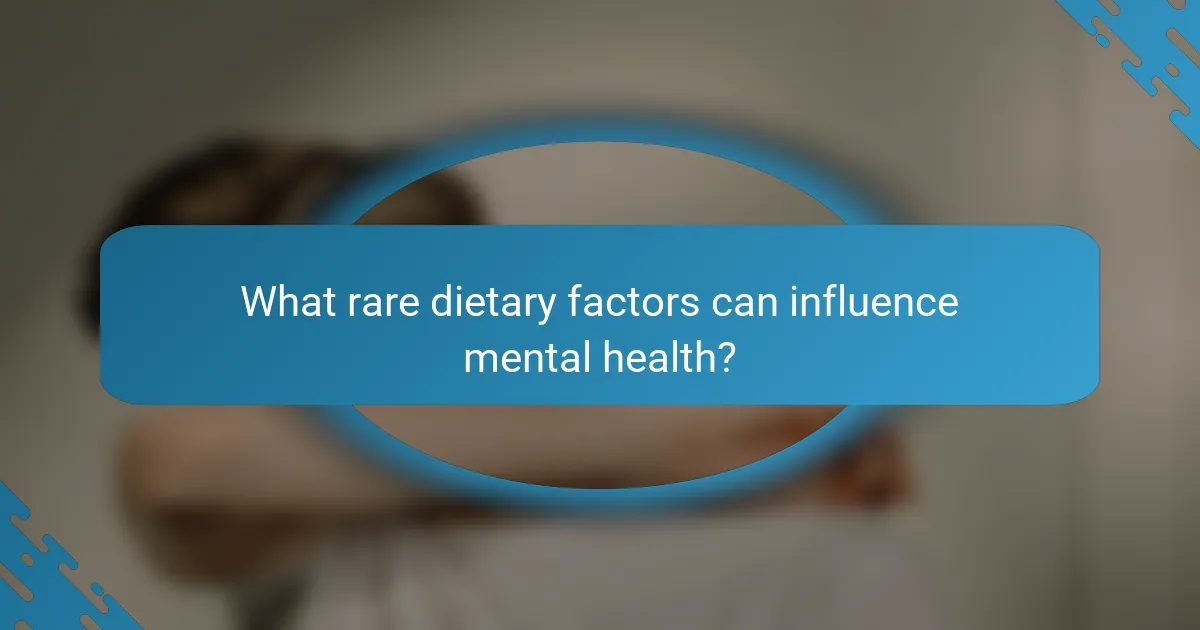Nutrition plays a crucial role in mental health for aging adults. A balanced diet can enhance cognitive function, reduce depression risk, and improve overall well-being. Focus on nutrient-dense foods rich in omega-3 fatty acids, antioxidants, and vitamins. Staying hydrated and following dietary patterns like the Mediterranean diet can further support mental clarity and mood stability.

How does nutrition influence mental health in aging adults?
Nutrition significantly influences mental health in aging adults by providing essential nutrients that support brain function. A balanced diet rich in omega-3 fatty acids, antioxidants, and vitamins can enhance cognitive abilities and reduce the risk of depression.
For example, foods like fatty fish, berries, and leafy greens offer unique attributes that promote neuroprotection and improve mood. Studies show that diets high in these nutrients correlate with lower rates of cognitive decline.
Additionally, hydration plays a rare but crucial role in mental clarity. Dehydration can lead to confusion and irritability, highlighting the importance of adequate fluid intake.
Incorporating these dietary strategies can lead to improved mental health outcomes for aging individuals, fostering a better quality of life.
What are the essential nutrients for cognitive function?
Essential nutrients for cognitive function include omega-3 fatty acids, antioxidants, vitamins B, D, and E, and minerals like magnesium and zinc. Omega-3s support brain structure and function, while antioxidants protect against oxidative stress. B vitamins are crucial for energy production and neurotransmitter synthesis. Vitamin D influences mood regulation, and magnesium supports cognitive processes. Adequate intake of these nutrients can enhance mental clarity and support long-term cognitive health in aging adults.
Which vitamins are crucial for brain health?
Vitamins crucial for brain health include B vitamins, vitamin D, and vitamin E. B vitamins, especially B6, B12, and folate, support cognitive function and reduce the risk of dementia. Vitamin D is linked to mood regulation and cognitive performance. Vitamin E acts as an antioxidant, protecting brain cells from oxidative stress.
How do omega-3 fatty acids support mental well-being?
Omega-3 fatty acids enhance mental well-being by reducing inflammation and supporting brain health. They are linked to lower rates of depression and anxiety. Research shows that individuals with higher omega-3 intake experience improved mood and cognitive function. These fatty acids are primarily found in fish, flaxseeds, and walnuts, making them essential for a balanced diet.
What role does hydration play in mental clarity?
Hydration significantly enhances mental clarity by improving cognitive functions. Adequate water intake supports brain health, facilitating focus and memory retention. Dehydration can lead to fatigue, confusion, and decreased attention span. Studies indicate that even mild dehydration can impair cognitive performance, highlighting the importance of maintaining proper fluid levels for optimal mental function.

What are the common dietary patterns linked to improved mental health?
Common dietary patterns linked to improved mental health include the Mediterranean diet, plant-based diets, and diets rich in omega-3 fatty acids. The Mediterranean diet emphasizes fruits, vegetables, whole grains, and healthy fats, which support cognitive function. Plant-based diets can reduce inflammation and promote mental well-being through nutrient density. Omega-3 fatty acids, found in fish and flaxseeds, are associated with lower rates of depression and anxiety. These dietary patterns contribute to overall mental health by providing essential nutrients and promoting a balanced lifestyle.
How does the Mediterranean diet benefit cognitive function?
The Mediterranean diet enhances cognitive function by providing essential nutrients that support brain health. Rich in healthy fats, antioxidants, and vitamins, this diet improves memory and reduces the risk of cognitive decline. Studies show that omega-3 fatty acids found in fish, along with polyphenols from fruits and vegetables, contribute to neuroprotection and improved mental performance. Additionally, the diet’s anti-inflammatory properties help maintain optimal brain function as individuals age.
What are the effects of a high-sugar diet on mental health?
A high-sugar diet negatively impacts mental health by increasing the risk of anxiety and depression. Excessive sugar consumption leads to inflammation and hormonal imbalances, which can worsen mood disorders. Research indicates that diets high in sugar are linked to cognitive decline and memory issues in aging adults. Reducing sugar intake can enhance overall mental well-being and improve mood stability.

What unique dietary considerations should aging adults keep in mind?
Aging adults should focus on nutrient-dense foods, hydration, and balanced macronutrients for optimal mental health. Essential nutrients like omega-3 fatty acids, B vitamins, and antioxidants support cognitive function. Regular meals and snacks help maintain energy levels and mood stability. Additionally, consider dietary restrictions or health conditions that may affect food choices.
How do food sensitivities impact mental health?
Food sensitivities can negatively affect mental health by causing inflammation and altering gut microbiota. These changes may lead to anxiety, depression, and cognitive decline in aging adults. For instance, gluten sensitivity has been linked to increased anxiety levels. A balanced diet rich in anti-inflammatory foods can help mitigate these effects and support mental well-being.
What are the signs of food allergies affecting mood?
Food allergies can significantly affect mood through symptoms like irritability, anxiety, and depression. These reactions often stem from the body’s inflammatory response to allergens, which can disrupt neurotransmitter balance. Identifying specific food triggers, such as gluten or dairy, may help improve mental well-being. Maintaining a balanced diet rich in nutrients can support mood regulation and overall mental health.
What specific dietary adjustments can help with age-related cognitive decline?
Dietary adjustments can significantly aid in mitigating age-related cognitive decline. Incorporating foods rich in antioxidants, omega-3 fatty acids, and vitamins can enhance brain health.
1. Increase intake of leafy greens like spinach and kale, which are high in nutrients that support cognitive function.
2. Include fatty fish such as salmon and mackerel, which provide omega-3 fatty acids essential for brain health.
3. Consume berries, particularly blueberries, known for their antioxidant properties that may improve memory.
4. Opt for whole grains like oats and quinoa, which help maintain steady energy levels for optimal brain function.
5. Add nuts and seeds, especially walnuts, which contain high levels of DHA, a type of omega-3 fatty acid linked to brain health.
6. Limit processed sugars and saturated fats, as they can negatively impact cognitive abilities over time.

What rare dietary factors can influence mental health?
Certain rare dietary factors can significantly influence mental health in aging adults. These include omega-3 fatty acids, which support cognitive function, and antioxidants like flavonoids, which may protect against neurodegeneration. Additionally, the presence of probiotics can enhance gut health, potentially impacting mood and anxiety levels. Emerging research suggests that polyphenols found in foods like dark chocolate and berries may also play a role in improving mental well-being.
How can probiotics affect mood and cognition?
Probiotics can positively influence mood and cognition by promoting gut health, which is linked to mental well-being. Research indicates that specific strains of probiotics may reduce anxiety and depressive symptoms. For example, Lactobacillus and Bifidobacterium strains have shown promise in enhancing cognitive function and emotional regulation. A balanced gut microbiome may also contribute to the production of neurotransmitters, such as serotonin, which plays a vital role in mood stability.
What is the impact of gut health on mental well-being?
Gut health significantly influences mental well-being by affecting mood and cognitive functions. A balanced gut microbiome can enhance neurotransmitter production, such as serotonin, which plays a crucial role in regulating mood. Research indicates that dietary choices, including fiber-rich foods and probiotics, can promote gut health and, consequently, improve mental health outcomes. For aging adults, focusing on nutrition that supports gut flora can lead to better emotional resilience and cognitive function.

What actionable dietary tips can aging adults implement for better mental health?
Aging adults can enhance mental health by adopting a nutrient-rich diet. Focus on incorporating omega-3 fatty acids, antioxidants, and vitamins that support brain function.
1. Include fatty fish like salmon and mackerel for omega-3s, which improve cognitive function.
2. Consume plenty of fruits and vegetables rich in antioxidants, such as berries and leafy greens, to combat oxidative stress.
3. Opt for whole grains like oats and quinoa to maintain stable blood sugar levels, which positively affects mood.
4. Stay hydrated; dehydration can impair cognitive abilities.
5. Limit processed foods and sugars that contribute to inflammation.
These dietary changes can significantly impact mental well-being in aging adults.
Which foods should be prioritized for mental wellness?
Prioritize foods rich in omega-3 fatty acids, antioxidants, and vitamins for mental wellness. Include fatty fish, leafy greens, berries, nuts, seeds, and whole grains. These foods support brain health and improve mood. Omega-3s from fish like salmon provide essential fatty acids that reduce inflammation. Antioxidants in berries combat oxidative stress, while vitamins from greens enhance cognitive function. Whole grains stabilize blood sugar, contributing to overall mental clarity.
What common dietary mistakes should be avoided?
Aging adults should avoid common dietary mistakes that can negatively impact mental health. These include skipping meals, relying on processed foods, neglecting hydration, and not consuming enough fruits and vegetables.
1. Skipping meals can lead to blood sugar fluctuations, affecting mood and cognitive function.
2. Processed foods often lack essential nutrients and can contribute to inflammation, which is linked to mental health issues.
3. Inadequate hydration can impair cognitive abilities and lead to fatigue.
4. A diet low in fruits and vegetables may result in insufficient vitamins and minerals, crucial for brain health.
By addressing these dietary mistakes, aging adults can support their mental well-being.
How can meal planning improve mental health outcomes?
Meal planning significantly enhances mental health outcomes by promoting balanced nutrition. Consistent meal preparation ensures intake of essential nutrients that support brain function and emotional well-being.
Research indicates that diets rich in omega-3 fatty acids, antioxidants, and vitamins can reduce symptoms of depression and anxiety. For aging adults, incorporating whole foods like fruits, vegetables, whole grains, and lean proteins can lead to improved cognitive function and mood stability.
Additionally, structured meal planning fosters routine, which can alleviate stress and anxiety. By reducing the daily decision-making burden regarding food choices, individuals can focus on healthier eating habits, leading to better mental health outcomes.